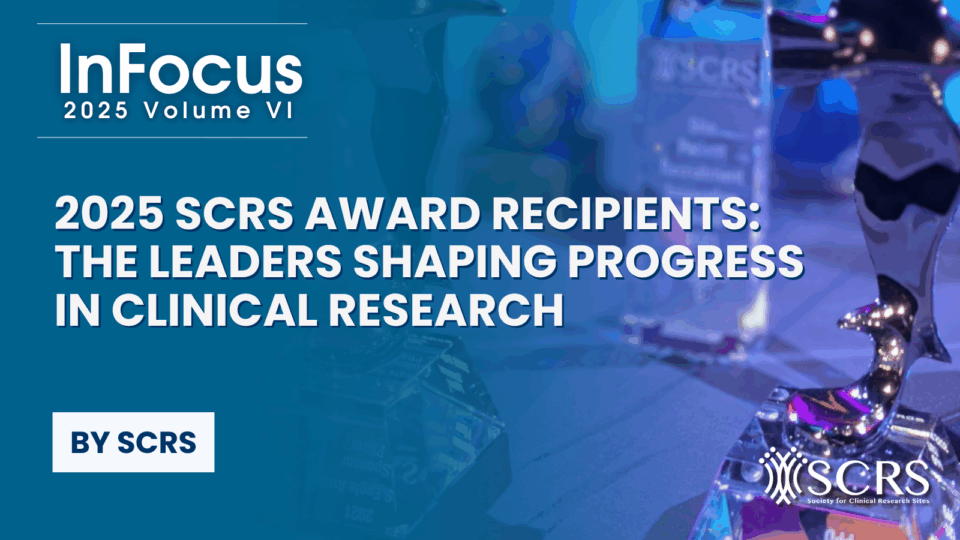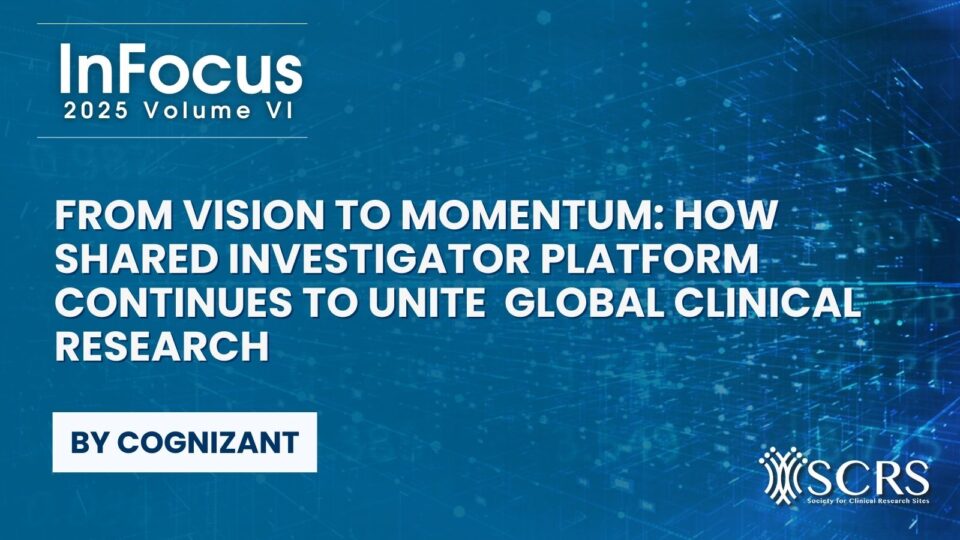SCRS Requests Site Input on New Medicaid Billing Requirement
On July 1, 2022, the Centers for Medicare & Medicaid Services (CMS) published the overdue form required for providers and sites to bill Medicaid for routine care in qualifying trials. This form is a new requirement under a recently passed federal law (Section 210 of the Consolidated Appropriations Act of 2021) that requires all states’ Medicaid programs to cover such services.
It has been hypothesized that the added requirement of this form will have the opposite impact of the law’s intent of increasing trial enrollment of Medicaid beneficiaries and will subsequently negatively impact the diversity, equity and inclusion of trial populations. SCRS is continuing to educate Congress on this issue and is keenly interested in sites’ experience with its implementation, specifically if it has impacted trial enrollment positively or negatively. While changing the law’s requirement of the form will quite literally take an act of Congress, SCRS has been successful in working with CMS to develop a more streamlined form than the original draft issued 6 months ago.
Overall, the discussions with CMS resulted in having the scope clarified so that the federal level is only to create the form and, because Medicaid is a state-implemented program, each state will have to answer questions on the implementation of the form and what we are supposed to do with it.
Frequently Asked Questions
Do we have to use this form?
If a site and/or an affiliated healthcare provider are expecting to have routine care in a qualifying trial reimbursed by Medicaid instead of the research sponsor, then yes, the form is required for each patient by the new law.
What if a subject has Medicaid as secondary insurance? Will the form still be required (i.e. if Medicaid is only picking up copays and deductibles)?
According to CMS, if Medicaid is being billed then the form will be required regardless of the amount.
How is “routine care” defined?
The law defined “routine care” essentially as:
(i) any item or service provided to prevent, diagnose, monitor, or treat complications resulting from such participation, to the extent that the provision of such an item or service to the individual outside the course of such participation would otherwise be covered under the State plan or waiver; and
(ii) any item or service required solely for the provision of the investigational item or service that is the subject of such trial, including the administration of such investigational item or service; and (B) does not include—
(i) an item or service that is the investigational item or service that is—
(I) the subject of the qualifying clinical trial; and
(II) not otherwise covered outside of the clinical trial under the State plan or waiver; or
(ii) an item or service that is— (I) provided to the individual solely to satisfy data collection and analysis needs for the qualifying clinical trial and is not used in the direct clinical management of the individual; and ‘‘(II) not otherwise covered under the State plan or waiver.
What is a “qualifying clinical trial”?
The law defines a “qualifying clinical trial” as:
The study or investigation is approved, conducted, or supported (which may include funding through in-kind contributions) by one or more of the following: (I) The National Institutes of Health. (II) The Centers for Disease Control and Prevention. (III) The Agency for Healthcare Research and Quality. (IV) The Centers for Medicare & Medicaid Services. ‘‘(V) A cooperative group or center of any of the entities described in subclauses (I) through (IV) or the Department of Defense or the Department of Veterans Affairs. (VI) A qualified non-governmental research entity identified in the guidelines issued by the National Institutes of Health for center support grants.
(VII) Any of the following if the conditions described in subparagraph (B) are met:
(aa) The Department of Veterans Affairs. (bb) The Department of Defense. (cc) The Department of Energy. (ii) The clinical trial is conducted pursuant to an investigational new drug exemption under section 505(i) of the Federal Food, Drug, and Cosmetic Act or an exemption for a biological product undergoing investigation under section 351(a)(3) of the Public Health Service Act. (iii) The clinical trial is a drug trial that is exempt from being required to have an exemption described in clause (ii).
What if I am a site that is not a Medicaid provider – does this give me the eligibility to start billing Medicaid?
It’s possible, however you will have to check with the beneficiary’s state Medicaid program, especially if you are in-state.
We are an outpatient site doing a study that requires routine care billed by a third party provider (e.g. a hospital, surgery center or other physician’s office). The Sponsor states they want the providers to bill Medicaid for the routine care of the qualifying trial. Who is responsible for getting the form?
Technically the billing entity is responsible. However, pragmatically speaking, the nature of the form indicates that the site/PI would obtain the form.
Does the new law cover out-of-state or out-of-network providers?
Generally, yes as the law states coverage shall be made without limitation on the geographic location or network affiliation of the health care provider treating such individual or the principal investigator of the qualifying clinical trial.
Of note, the billing provider still has to follow the beneficiary’s state Medicaid process for obtaining reimbursement. Such provider is strongly encouraged to understand the beneficiary’s state nuances and reimbursement rates prior to conducting services.
Does the new law have any expediency requirements?
The new law requires states’ coverage decisions shall be expedited and completed within 72 hours.
Is there anything else other than the form that is needed?
The state may require other items. The law currently states that they shall not require submission of the protocols of the qualifying clinical trial, or any other documentation that may be proprietary or determined by the Secretary to be burdensome to provide.
Will this add to site costs?
Yes, it will likely add to site costs as it is extra work, compliance risk and tracking. Sites that are intending to bill Medicaid for routine care should be in contact with their Sponsors and CROs about the added burden on site costs as well as diversity/equity/inclusion plans.
CMS has indicated that the following will be decided by each individual state:
- Whether a form can be signed in counterparts (i.e. one signature signed locally and another supplied by fax or email scan which collectively is two signatures).
- If the form must be signed PRIOR to enrollment in the trial and obtaining routine care services or if it can be signed after services are rendered
- Can the healthcare provider be a physician or can other disciplines sign in that capacity?
- What are we supposed to do with the form? Is it to only be housed in the patient’s record or is it to be submitted with the bill?
- The law requires the form effective January 1, 2022. However, the form was not published until July 1. Are sites/providers required to obtain a form to attest for services provided January 1, 2022 through June 30, 2022? Or is this only effective July 1?
- Will the form be required for items and services billed on or after July 1, regardless of when the patient was enrolled? For example, if a beneficiary was enrolled in a qualifying clinical trial in 2020 and will receive routine care services in August of 2022, will a form be required?
What revisions to the proposed form was SCRS successful in obtaining in the final version?
- We obtained that the Principal Investigator can also sign as the Health Care Provider which was a huge win, as it eliminated the need for the patient to see another physician.
- We eliminated having both the written name of the trial and “link to the trial” as the trial identifiers and only have a single trial identifier, that of the NCT number from www.clinicaltrials.gov
- We were able to educate CMS that the title is not “Principle Investigator” but “Principal Investigator”.
- We were able to remove the requirement of adding the PI’s and Health Care Provider’s NPI number on the form under their signature.
- The original form asked for the patient’s name 3 times and their Medicaid ID number twice. We were able to get those consolidated into only asking for that information once.
- The form was originally two pages – the first page being narrative and the second page gathering the information, which is not ideal for 2-sided scanning. We were able to reduce it to a single page.
We at SCRS will continue to educate Congress on the impact of this form on Medicaid beneficiaries’ ability to enroll in clinical trials. We need your help in giving us your experience and data. Please reach out to communications@myscrs.org to share your experience.



